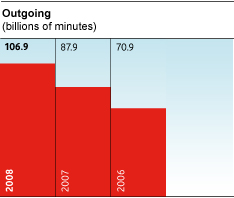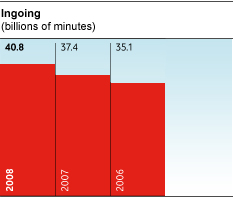Voice services
Voice revenue
£24,879m
(2007: £22,268m, 2006: £21,304m)

Voice minutes usage growth for the Group’s principal mobile markets(1)


| Note: | |
|---|---|
| (1) | Germany, Italy, Spain and the UK |
Revenue from voice services, earned when customers make and receive calls, is classified primarily as outgoing voice, incoming voice and voice roaming. In addition, the Group is delivering on customers’ total communications needs and driving greater voice usage through offering integrated fixed location based communications services.
Outgoing voice
The fees charged to a Vodafone mobile customer who initiates a call are classified in outgoing voice revenue. Despite price pressures in many markets due to the competitive environment, increased outgoing voice usage generated from the success of the wide range of tariffs and propositions on offer and the overall increase in the customer base in the Group has led to outgoing voice revenue staying relatively stable as a proportion of Group service revenue.
Propositions relating to voice services feature heavily in the tariffs and promotions that the Group offers its customers. In particular, the development of a range of unlimited value offers has been particularly appealing to customers and has stimulated voice usage growth. An example includes free weekend calling, which had strong customer acceptance in markets such as the UK, Germany and Ireland. These offers increase customer engagement with their mobile phone and Vodafone services in general, driving a broader increase in usage.
Incoming voice
Incoming voice revenue is generated when a Vodafone mobile customer receives a call from a user on another fixed or mobile network. Fees classified as incoming voice revenue are generally not charged to the Vodafone customer receiving the call but, rather, the telecommunications company that routed the call to the Vodafone network.
These fees are generally based on termination rates determined by local regulators. Due to regulation in many markets it has been the trend for these rates to fall in recent years, and for the year ended 31 March 2008 incoming voice revenue generated 14% of the Group’s total service revenue. This has declined from 15% and 17% in the previous two financial years respectively. For further details see Additional Information – Regulation.
Voice roaming
When travelling abroad, roaming allows Vodafone’s customers to use the Group’s services on a mobile network in a country they are visiting. The Group continued to expand its roaming coverage and services during the 2008 financial year. The focus was to drive customer satisfaction through greater value, transparency and simplicity across Vodafone’s roaming propositions.
Vodafone’s flagship roaming tariff, Vodafone Passport, enables customers to “take their home tariff abroad”, offering greater price transparency and certainty to customers when they are roaming. While abroad, customers can make calls using their domestic tariff, in some cases including free minute bundles, and receive calls at no charge for a one-off connection fee per call.
Customer usage patterns continue to show that, on average, Vodafone Passport customers both talk more and pay less per call when abroad. Customer research also indicates that Vodafone’s customers have a greater preference for Vodafone Passport over the regulated roaming rates, which has been substantiated by the relative uptake of the two propositions since the summer of 2007.
Vodafone Passport was not directly affected by regulation relating to roaming prices introduced by the European Union in June 2007. However, by 31 August 2007, all of Vodafone’s 12 European markets had reduced the price of their Vodafone World tariff in order to comply with the regulation.
Fixed location based services
The Group is delivering on customers’ total communications needs and driving greater voice usage through offering integrated communications services.
Vodafone At Home
Vodafone At Home comprises a range of offers designed to introduce Vodafone into the household as a total communications provider. Vodafone At Home voice propositions offer customers the opportunity to satisfy their communications needs through one operator and with a single device.
Continued progress has been made to drive customer uptake of Vodafone At Home voice services with an option for at home calling now available in most of the Group’s European markets. These take the form of either zonal tariffs, through which customers can call for a reduced rate when in their home area, or alternatively in several markets unlimited calling to fixed line numbers for a fixed subscription has been introduced, providing a strong incentive for customers to use their mobile rather than their fixed line in the home environment.
The development of Vodafone’s total communications capability, including the increasing availability of fixed broadband in many markets, will widen the range of services which can now be offered as part of the Vodafone At Home portfolio.
Vodafone Office
Vodafone Office is the umbrella name for a series of products and services designed to meet all business customers’ communications needs.
Vodafone Wireless Office provides companies the opportunity to embrace the benefits of mobilising their workforce and reduce their number of fixed desk phones, facilitating the transfer of voice minutes from the fixed to the mobile network. The solution includes a closed user group tariff, allowing employees to call each other for a flat monthly fee. In Germany, Spain, Greece, Italy and Portugal, the offer has been expanded to include location based office zone charging, giving preferential rates when calling from an office location. Additionally, in some markets, geographic numbers have been introduced, enabling further fixed to mobile substitution.
Additionally, the Group is actively promoting fixed line telephony to business customers in six controlled markets, in line with its total communications strategy.
